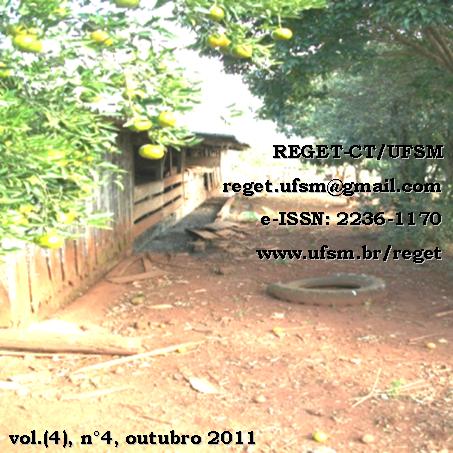EDUCAÇÃO AMBIENTAL NA ESCOLA: DA COLETA SELETIVA DO LIXO AO APROVEITAMENTO DO RESÍDUO ORGÂNICO
DOI:
https://doi.org/10.5902/223611703909Palavras-chave:
Meio Ambiente, Conscientização, Coleta Seletiva, Compostagem.Resumo
http://dx.doi.org/10.5902/223611703909
O presente trabalho teve como objetivo implementar a Educação Ambiental na Escola Estadual de Ensino Fundamental Capitão Emídio Jaime de Figueiredo. Ao observar-se o comportamento da comunidade que circunda a escola, principalmente em relação ao destino do lixo produzido nas residências e, de analisar os questionários que foram usados para coletas de dados, foi possível perceber que os moradores ainda não tinham esclarecimentos suficientes com relação ao assunto em questão, embora alguns sentissem necessidade de mudar essa realidade. Para isso foi proporcionado à comunidade escolar uma palestra de esclarecimento e uma caminhada ecológica pelo bairro, com a participação de professores e alunos, onde foram distribuídos panfletos contendo informações a respeito de questões como: reciclagem, compostagem, coleta seletiva e de como está sendo dinamizado este trabalho no município. Ficou clara a necessidade de a escola trabalhar no sentido de proporcionar à comunidade escolar uma consciência ecológica, visando à transformação da realidade atual, o respeito ao meio ambiente e a melhoria da qualidade de vida dos moradores.
Downloads
Referências
BRASIL, Conselho Nacional do Meio Ambiente. Lei nº 6.938 de 31 de agosto de 1981. Publicada no DOU de 02.09.1981.
BRASIL, Constituição da República Federativa do Brasil de 1988. Acessado em agosto de 2009. Disponível em: http://www.planalto.gov.br
BRASIL, Secretaria de Educação Fundamental. Parâmetros Curriculares Nacionais: Meio Ambiente, Saúde / Secretaria de Educação Fundamental, Brasília: MEC/SEF, 1998.
CARVALHO, I. C. de M. Educação Ambiental: a formação do sujeito ecológico. 2 ed. São Paulo: Cortez, 2006.
CONSELHO NACIONAL DO MEIO AMBIENTE-CONAMA. Resolução Nº 275 de 25 de Abril de 2001. Publicado DOU em 19/06/2001.
DIAS, G. F. Educação Ambiental: princípios e práticas. 5 ed, São Paulo: Global, 1998.
GALVÃO, M. Reciclagem conquista o respeito do mercado. In: Revista: Plásticos Modernos, nº 305, dez/jan, 2000.
KIEHL, E.J. Fertilizantes Orgânicos. Piracicaba: Editora Ceres, 1985.
KLOETZEL, K. O que é meio ambiente (Coleção primeiros passos). São Paulo: Brasiliense, 1998
LEFF, E. Saber Ambiental: sustentabilidade, racionalidade, complexidade, poder. Petrópolis: Vozes, 2001.
LÜDKE, M. & ANDRÉ, M. E. D. A. Pesquisa em Educação: abordagens qualitativas. São Paulo: EPU, 1986.
MARQUES, J. R. Meio Ambiente Urbano. Rio de Janeiro: Forense Universitária, 2005.
MELLO FILHO, L. E. de (org.) et al. Meio Ambiente & Educação. Rio de Janeiro: Gryphus, 1999.
MÜLLER, J. Educação Ambiental: diretrizes para a prática pedagógica. Porto Alegre/RS: Edição FAMURS, 1998.
PEREIRA, A. B. Aprendendo ecologia através da educação ambiental. Porto Alegre: Sagra- DC Luzatto, 1993.
PIRES, M. R. Educação Ambiental na Escola. Belo Horizonte: Soluções Criativas em Comunicação, 1996.
RESÍDUOS (Tempo de Decomposição na Natureza): Disponível em:
http://www.ambientebrasil.com.br Acessado nos meses de novembro e dezembro/2009. RODRIGUES, L.F. Lixo: de onde vem?, para onde vai?, São Paulo: Moderna, 1997.
SEGURA, D. de S. B. Educação Ambiental na Escola Pública: da curiosidade ingênua a consciência crítica. São Paulo: Annablume: Fapesp, 2001.
TRAVASSOS, E. G. A Prática da Educação Ambiental nas Escolas. Porto Alegre: Mediação, 2004.






